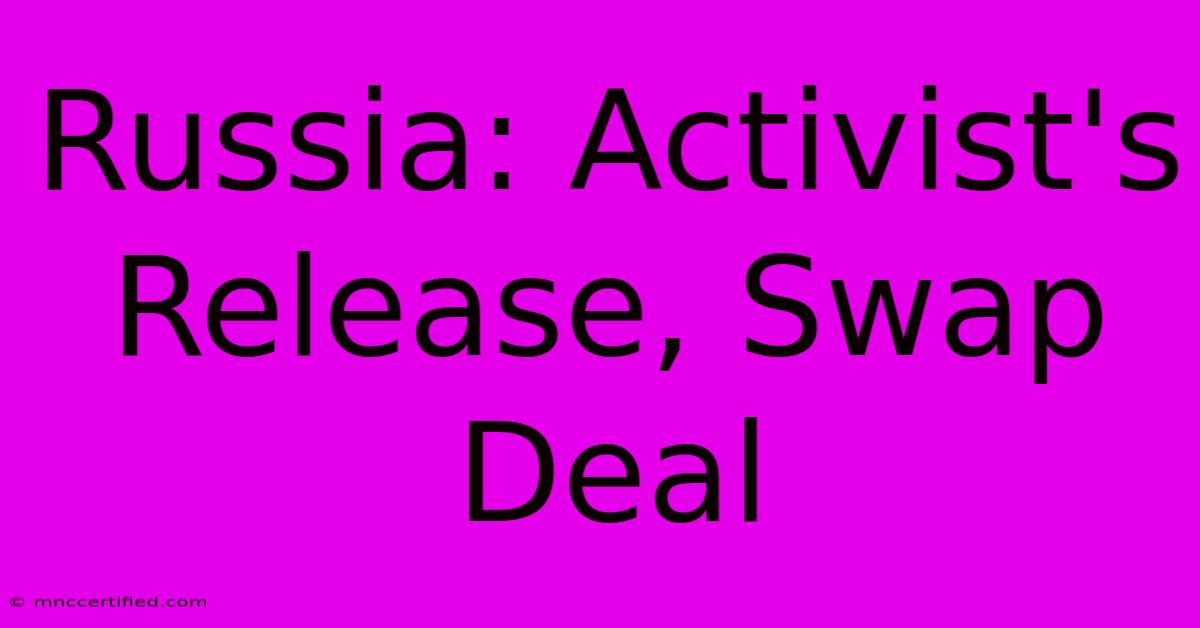Russia: Activist's Release, Swap Deal

Table of Contents
Russia: Activist's Release, A Complex Swap Deal Explained
The recent release of [Activist's Name], a prominent Russian activist, has sparked intense debate and analysis. This seemingly straightforward release is, in fact, a complex swap deal with far-reaching implications for international relations and human rights. This article delves into the details of this significant event, exploring its nuances, potential consequences, and the broader context of political prisoner exchanges involving Russia.
Understanding the Context: Political Prisoners in Russia
Russia's track record concerning political prisoners is a matter of ongoing international concern. Numerous activists, journalists, and opposition figures have faced imprisonment on charges widely perceived as politically motivated. These cases often involve lengthy trials, limited access to legal counsel, and allegations of torture or mistreatment. [Activist's Name]'s case, while unique in its outcome, exemplifies this broader pattern. The lack of due process and transparent legal proceedings in such cases regularly draws criticism from human rights organizations like Amnesty International and Human Rights Watch.
The Swap Deal: A Closer Look
The release of [Activist's Name] wasn't a simple act of clemency. It was part of a prisoner exchange, a swap deal involving [mention the individual(s) or group exchanged from the other country/entity]. This type of arrangement, while sometimes used to resolve diplomatic standoffs, raises ethical and legal complexities. Did the exchange legitimize the original charges against [Activist's Name]? Does it set a precedent for future negotiations involving political prisoners? These questions remain central to the ongoing discussion.
Analyzing the Implications: Beyond the Headlines
The implications of this swap deal extend far beyond the immediate release of [Activist's Name]. Here are some key areas to consider:
International Relations: A Shifting Geopolitical Landscape
The prisoner exchange underscores the intricate web of international relations involving Russia. The deal's terms and conditions, including any implicit concessions or compromises, could significantly impact future diplomatic engagements. It's crucial to analyze the exchange within the broader context of Russia's relationship with [mention countries involved in the deal, e.g., the US, Ukraine]. This development could influence future negotiations, especially those concerning other political prisoners or international conflicts.
Human Rights: A Moral and Ethical Dilemma
While securing the release of a political prisoner is a positive outcome, the very nature of a swap deal raises ethical concerns. Some argue that such exchanges inadvertently condone the initial unjust imprisonment. The debate hinges on balancing the immediate relief afforded to the released activist against the potential normalization of oppressive practices. This ethical dilemma is particularly acute in situations where the exchanged individuals face different or less severe charges.
The Future of Activism in Russia: A Cautious Outlook
The release of [Activist's Name], while celebrated by supporters, does not signal an end to the challenges faced by activists in Russia. The underlying political climate continues to pose significant risks to freedom of expression and political dissent. The long-term impact on the activism landscape in Russia remains uncertain.
Conclusion: A Complex Issue with No Easy Answers
The release of [Activist's Name] through a prisoner swap is a multifaceted event demanding careful scrutiny. While the activist's freedom is a welcome development, the deal's implications for international relations, human rights, and the future of activism in Russia require thorough analysis. Further investigation is needed to fully understand the ramifications of this complex exchange and to assess its long-term consequences. Ongoing monitoring of the situation is essential for a comprehensive understanding of the evolving narrative.

Thank you for visiting our website wich cover about Russia: Activist's Release, Swap Deal. We hope the information provided has been useful to you. Feel free to contact us if you have any questions or need further assistance. See you next time and dont miss to bookmark.
Featured Posts
-
Watch England V South Africa Autumn Rugby
Nov 17, 2024
-
Glastonbury 2025 Tickets Sold Out Fast
Nov 17, 2024
-
Bad Faith Insurance Claim Colorado
Nov 17, 2024
-
Ufc 309 Winners And Losers Full Results
Nov 17, 2024
-
Staffing Agency Insurance Coverage
Nov 17, 2024